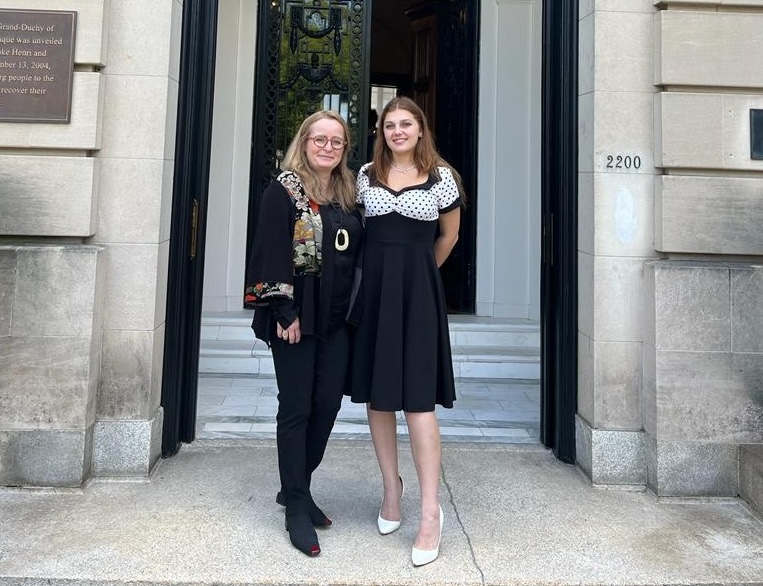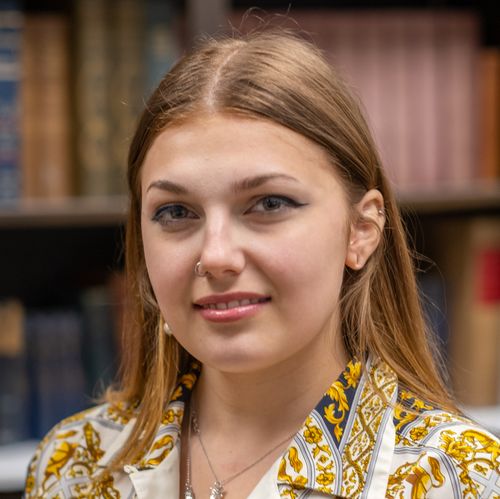Senior from Luxembourg investigates new approaches on how the West thinks about terrorism
Jacky Linden ‘24, a Diplomacy and Global Politics and History major, encourages experts to put more emphasis on understanding what motivates people to take extreme actions.

Senior from Luxembourg investigates new approaches on how the West thinks about terrorism
When Luxembourg native Jacky Linden came to Miami, she was committed to studying both History and Diplomacy and Global Politics, partially because of the terrorist attacks on Paris in November 2015.
“I’m from Luxembourg, and the Paris attacks happened when I was 14 or 15,” said Linden. “I also grew up around refugees from Syria that had fled ISIS, so I’ve always been fascinated by terrorism. I came in from a standpoint of wanting to stop it.”
During spring semester 2023, Linden received an internship with the Potomac Institute for Policy Studies, a nonpartisan nonprofit organization based in Arlington, Virginia. There, she studied under one of the foremost scholars in the field of terrorism studies, Yonah Alexander, but found that she fundamentally disagreed with their approach to counterterrorism. This motivated her to pursue a research project based on improving how Western countries go about understanding and preventing terrorism.
A key aspect of Linden’s research, developed as a part of the History Honors and Undergraduate Summer Scholars programs, is understanding the history behind counterterrorism studies and the origin of much of the logic that is still used today.
 “I found that the root of this logic is sadly in colonialism,” said Linden. “If you look at the policies we have now, especially with the global war on terror, it is very shocking to see that they pulled directly from the thought of colonial wars of conquest and subjugation in the 19th and 20th centuries.”
“I found that the root of this logic is sadly in colonialism,” said Linden. “If you look at the policies we have now, especially with the global war on terror, it is very shocking to see that they pulled directly from the thought of colonial wars of conquest and subjugation in the 19th and 20th centuries.”
At a time where wars are being fought all over the world, Linden believes her research is more relevant now than ever before. She also emphasized that most individuals involved with counterterrorism don’t understand that there is a fundamental flaw with their current method of thinking.
“What I’m trying to do and say through my research is that if we don’t come back and try and combat the root causes of why people commit political violence, it is just going to be a continuation,” Linden said.
Linden explained that, from her view, terrorist acts and extremism are the product of the decade-long ignorance of legitimate and peaceful demands for self-determination or respect of other fundamental human rights. Any solution meant to prevent future terrorist acts must seriously engage with the alleviation of these nuisances and adherence to international law.
A solid faculty support system at Miami has helped Linden with her groundbreaking research. She has received guidance from both Amanda McVety, professor of History and her faculty advisor, and Nathan French, associate professor of Comparative Religion.
“Professor McVety is really helpful in trying to help me focus my thoughts,” said Linden. “At this point, I have read and learned so much I could write two books! As for Professor French, he actively studies different Islamist groups and teaches a class called Global Jihadism, where we try to understand various worldviews.”
Once her research has concluded, Linden said that her next step is to go to Washington, DC to communicate her research with policymakers. To accomplish this, she has been taking advantage of Miami’s resources through the ASPIRE office.
As far as long-term plans, Linden is hoping to take the knowledge that she has gained during this project and apply it to graduate school and eventually join the Luxembourg Ministry of Foreign and European Affairs. She encourages anyone interested in research to partake in a project of their own.
“It’s a great experience, and it teaches you a lot about the world,” Linden said. ”Especially in the humanities, you learn that worldviews are constructed through various channels. There is no ‘right’ one.”